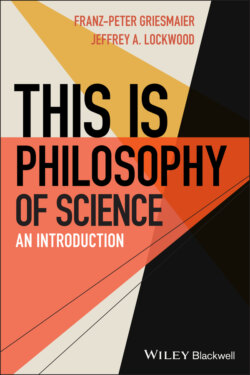Читать книгу This is Philosophy of Science - Franz-Peter Griesmaier - Страница 20
1.4.2 Perspectivism
ОглавлениеAlthough relativism, at least in its unsophisticated form, is not a plausible response to disagreements about what is true, there is a viable approach that allows for the truth of multiple claims about the world, but not the truth of every claim as relativists would contend. Ronald Giere advocated for scientific perspectivism, a philosophical position mediating between the hard-driving objectivism of most scientists (as well as the unyielding realism of many philosophers of science), and the “anything goes” constructivism found among postmodern social scientists and humanists. Perspectivism contends that while there is an objective reality, our statements about its features are always made from a particular viewpoint (both literally and figuratively) and are hence partial truths, at best. This position fundamentally differs from relativism in that once a perspective is chosen, claims about the natural world can be empirically tested and refuted or confirmed.
The notion that truth claims are always relative to a perspective is, as Giere points out, not radical. Even the staunchest empiricists cannot escape the fact that scientific claims are relative to language. What Giere initially proposed was to extend linguistic contextualization to one’s physical position (both in relation to the object of study and the internal processing of the incoming signal).
Consider, for example, a biologist who asserts that the petals of a particular flower are white. One need only look to see that this is true. However, suppose another biologist comes along with a device which reveals ultraviolet reflectance, looks through this instrument at the flower, and declares that it is striped. And, in fact, some flowers have so-called “bee guides” that direct bees, which can see in the ultraviolet, to the stamen and nectary which provide pollen and nectar. Which description of the flower is true? The perspectivist would respond that the truth of the competing claims depends on whether the accounts are rendered from the viewpoint of a human or a bee. Note however, that once the perspective is fixed, the descriptions can be wrong; from the human perspective it would be mistaken to call the flower red, and from the bee perspective it would be wrong to assert the flower is checkered.
While this example illustrates that scientific claims are conditional on biophysical and instrumental perspectives, Giere also maintained that propositions are made within a theoretical context. For example, a sociobiologist might contend that helping a neighbor is explained in evolutionary terms by reciprocal altruism, while a cultural anthropologist might argue that cooperation serves to strengthen social bonds in a community. Along similar lines, a neurophysiologist might explain that people eat sweet foods because sugars stimulate nerves leading to the gustatory and reward regions of the brain, while an evolutionary biologist might explain that sweetness is favored by its association with concentrated sources of energy which were rare in the history of our species. Giere maintained that extreme pluralism arises from a multitude of competing, theoretical perspectives in empirically weak scientific fields at the limits of experimental capabilities (e.g., gravity waves).
Others philosophers have pushed perspectivism further, to take into account the possibility of different interests. That is, to assess a scientific claim, the needs and desires of the investigator are relevant. When asked if a forest fire should be allowed to burn, an ecologist might answer that the dominant trees in the ecosystem of concern are pyrophytic, requiring fire to reproduce, so “let it burn.” But another ecologist might answer that the last surviving population of the endangered yellow-spotted salamander lives in the ponds within the burning forest and the fire should be extinguished to conserve this species. And an ecologist working for a forest products company might insist that jobs would be lost if the fire is not controlled.
You can see that perspectivism admits that scientists may have differing values and, in fact, there is no value-free science (at a minimum, scientists value knowledge). If the forest fire is allowed to burn it is true that the plants will recover (a long-term perspective valuing natural processes), that the amphibian will go extinct (a perspective valuing the existence of species), and that people will be harmed (a short-term perspective valuing economic well-being). So, while logically incommensurable claims are not countenanced from a given perspective (e.g., it cannot be the case that the salamander is both endangered and flourishing at this time), incommensurable conclusions can be drawn from scientific data when perspectives diverge (e.g., forest health might be harmed in the short-term and benefited in the long-term by the same event).
